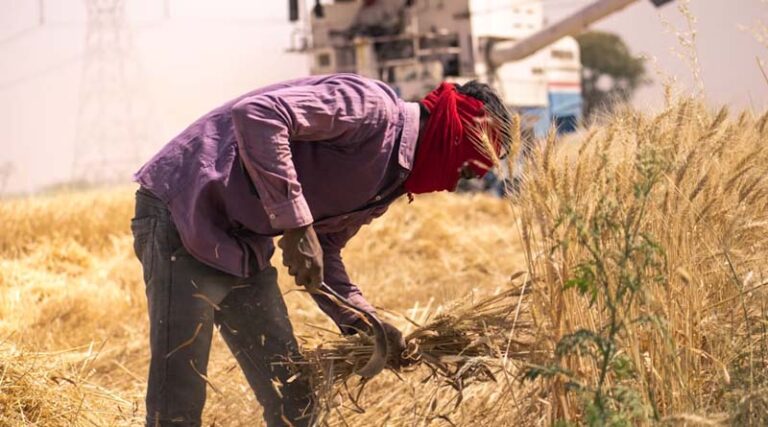
The Rising Menace of Fake Agri-Inputs in India: A Threat to Agriculture, Farmer and Food Security
16 July 2025, New Delhi: India’s agricultural sector, the backbone of its economy, is under siege from a growing crisis, the proliferation of counterfeit seeds, fertilisers, and pesticides. Recent raids in Rajasthan have exposed a vast network of factories producing fake agricultural inputs, raising serious concerns about farmer livelihoods, crop yields, and long-term soil health.
The scale of the scam is staggering. Over 30 factories were raided in Rajasthan alone, where industrial waste such as marble slurry, stone dust, and carcinogenic dyes were being repackaged and sold as branded fertilisers and seeds treatment chemicals. These adulterated products not only fail to nourish crops but also degrade soil fertility, posing a grave threat to food security.
The Extent of the Scam
Investigations revealed that factories in Jaipur, Kishangarh, and Sriganganagar were manufacturing counterfeit fertilisers by mixing marble waste, sand, and synthetic dyes. These products were then packaged under well-known brand names and sold to unsuspecting farmers across Rajasthan, Punjab, Haryana, Uttar Pradesh, and Bihar.
The modus operandi involved processing industrial waste by heating, granulating, and colouring it to mimic genuine fertilisers like DAP (Di-Ammonium Phosphate) and SSP (Single Super Phosphate). Some units were supplying over two lakh bags daily, affecting millions of farmers. The use of fake fertilisers deprives crops of essential nutrients, leading to poor yields and long-term soil degradation.
Toxic Seeds: Carcinogenic Dyes and Expired Stock
In a parallel scam, seed manufacturers were found repackaging expired or low-quality seeds and coating them with harmful dyes to enhance their appearance.
Agriculture officials discovered that seeds were being treated with carcinogenic chemicals to make them look more vibrant. For instance, green dye was used on moong (green gram) seeds, while red dye was applied to barley and guar seeds. These chemicals pose severe health risks to farmers handling them and to consumers if traces remain in food products.
Additionally, expired seeds were being repackaged in new bags and falsely marketed as fresh stock. At Harvester Food, a factory in Sriganganagar, authorities found old seeds being sprayed with paint to appear viable. Such fraudulent practices directly impact germination rates, leading to crop failures and financial losses for farmers.
Pesticide Fraud: Substandard and Unauthorised Products
The crackdown extended to pesticide manufacturers, where raids uncovered substandard and counterfeit products. One notable case involved a warehouse linked to the family of former IPL chairman Lalit Modi, where fake pesticides were being stored under the brand name Indofil Industries.
Rajasthan’s agriculture minister Kirodi Lal Meena stated that these pesticides, sold at high prices, had failed to protect cotton crops from whitefly infestations, resulting in massive losses. Fake pesticides not only fail to control pests but can also introduce toxic residues into crops, endangering food safety.
Regulatory Lapses and Corruption
Despite the existence of quality control mechanisms, the widespread fraud points to deep-rooted negligence and possible collusion between manufacturers and officials.
In December 2024, inspection teams from the Rajasthan Agriculture Commissioner’s office had cleared several factories later found guilty of producing fake fertilisers. No action was taken on their reports, raising suspicions of deliberate oversight.
Minister Meena has demanded an investigation into why these units were given clean chits despite clear violations. The failure of regulatory bodies to enforce standards has allowed this illegal trade to flourish, putting farmers at risk.
Political and Administrative Challenges
The raids, spearheaded by Rajasthan’s Agriculture Minister Kirodi Lal Meena, have also sparked political debates. Some critics allege that the crackdown selectively targets certain businesses, while others argue that the administration had ignored these scams for years.
Congress MLA Vikas Choudhary questioned how such large-scale operations could go undetected in areas under the jurisdiction of high-ranking officials. The controversy highlights the need for stronger oversight and accountability in agricultural input regulation.
Impact on Farmers and Agriculture
Farmers relying on fake inputs face devastating consequences. Poor-quality seeds lead to low germination rates, while adulterated fertilisers stunt crop growth. Pesticides that fail to control pests result in infestations, forcing farmers into debt due to repeated crop losses.
In Sriganganagar and Hanumangarh, cotton farmers reported lakhs of acres destroyed by ineffective pesticides. Many small-scale farmers, already struggling with rising input costs, are pushed further into financial distress.
Long-Term Soil and Environmental Damage
The use of marble slurry and industrial waste in fertilisers introduces harmful substances into the soil, reducing its fertility over time. Contaminated seeds and pesticides further degrade farmland, making sustainable agriculture difficult.
If unchecked, this trend could lead to long-term ecological damage, affecting food production and water quality in key agricultural regions.
Government Response and Future Measures
The Rajasthan government has intensified raids, sealing over 40 factories involved in fake agri-input production. FIRs have been filed, and samples are being tested for legal prosecution.
Minister Meena has warned of strict action against negligent officials and vowed to continue surprise inspections. The formation of a dedicated quality control wing within the agriculture department is a step toward better enforcement.
Need for Stronger Policies and Farmer Awareness
The rise of fake agricultural inputs in India is not just an economic fraud but a direct threat to food security and farmer welfare. While recent raids have exposed the scale of the problem, systemic reforms and stricter enforcement are needed to protect farmers and ensure the integrity of India’s agricultural supply chain.
The government’s zero-tolerance stance must translate into sustained action, ensuring that those exploiting farmers face severe consequences. Only then can the trust of millions of farmers be restored, securing the future of Indian agriculture.
Also Read: Bayer Launches Felujit: A Next-Generation Fungicide to Combat Sheath Blight in Paddy in India
📢 If You’re in Agriculture, Make Sure the Right People Hear Your Story.
From product launches to strategic announcements, Global Agriculture offers unmatched visibility across international agri-business markets. Connect with us at pr@global-agriculture.com to explore editorial and advertising opportunities that reach the right audience, worldwide.






